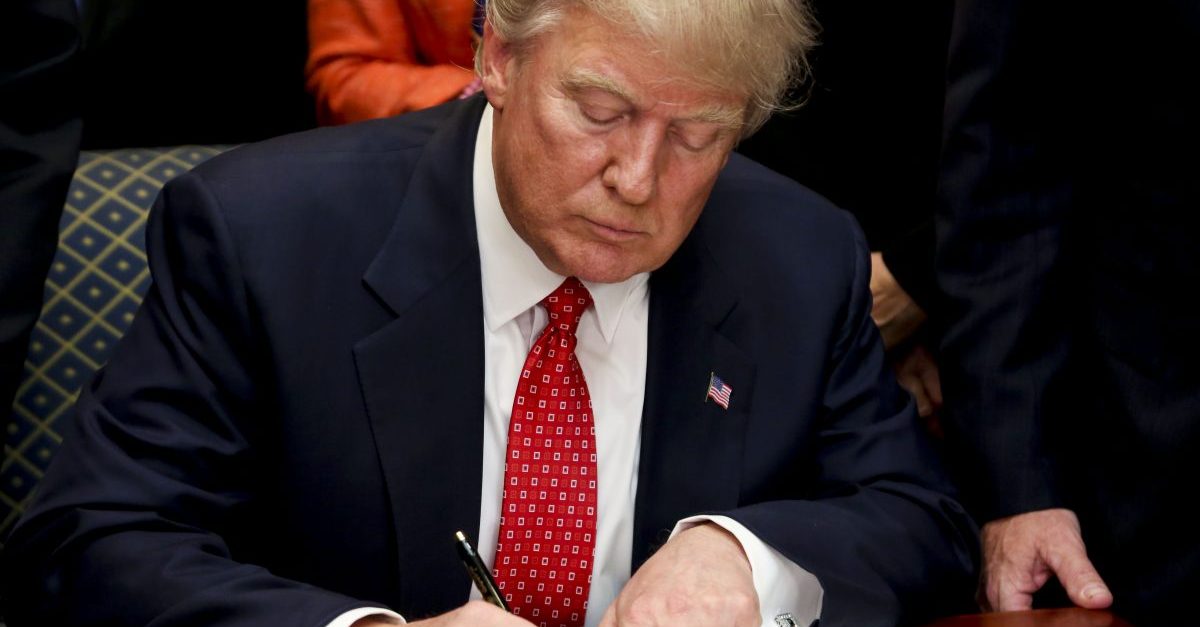
President Donald Trump’s latest lawsuit–filed against Manhattan District Attorney Cyrus Vance and the president’s own accounting firm on Thursday morning–is a direct bid to keep the public from ever seeing his personal tax returns. The implications, however, could stretch well beyond the specific issue of financial disclosure.
But why exactly is this latest effort potentially so important? Largely because of the way Trump and his attorneys are arguing the point.
The 20-page filing stylized as Donald Trump v. Cyrus Vance, et al. controversially argues that a sitting president absolutely cannot be arrested, imprisoned, detained, “investigated, indicted, or otherwise subjected to the criminal process,” while in office.
Essentially, it’s an assertion that the president is above the law. And Trump clearly wants to test this theory before the Supreme Court.
Citing heavily from a legal memo authored by the Department of Justice’s Office of Legal Counsel in the year 2000, the filing reads:
While the Supreme Court has held that a private litigation can sue the President in federal court for his unofficial conduct, criminal process comes with a “distinctive and serious stigma” that “imposes burdens fundamentally different in kind from those imposed by the initiation of a civil action” burdens that would intolerably “threaten the President’s ability to act as the Nation’s leader in both the domestic and foreign spheres.”
Notably, the Thursday morning filing also approvingly cites from a law review article written by then-judge Brett Kavanaugh 10 years ago. Various commentators referenced the Kavanaugh article during the newest justice’s confirmation battle–predicting that Kavanaugh’s imperial views on presidential immunity would likely come into play sooner rather than later. Those critics may have foreseen correctly.
So, how might all of this legal wrangling shake out? Let’s consult some of the experts.
Tor Ekeland is a criminal defense attorney who represents clients in the federal system. In comments to Law&Crime, he dismissed Trump’s argument as antithetical to how the American is intended to work.
“It’s a foundational principle of our Republic that no one is above the law,” Ekeland said. “When the Founders fought the Revolution they were rejecting the type of monarchical thinking involved in the worship of an untouchable President.”
Ekeland conceded, however, that “there might be an argument that reasonable limitations should be placed on the ability to investigate a sitting President in order to tamp down the fervor of baseless partisan harassment masquerading as legitimate investigation.”
He also offered the following counterfactual argument in favor of subjecting a sitting president to criminal law:
If the President were to rape, and then murder, a citizen on national television by shooting them in the head on 5th Ave in broad daylight, does the Constitution dictate that nothing can be done to the President with the possible exception of Impeachment? And if so, can the President rape and murder until impeachment proceedings wind their way through Congress?
“Those that argue that the President is untouchable in office can’t reconcile that consequence of their viewpoints with their purported commitment to the rule of law,” Ekeland continued, “particularly when they use legal arguments to justify anarchy when it comes to the presidency.”
Harvard Law Professor Laurence Tribe, a constitutional law scholar, also thinks Trump’s argument here is destined to fail–but he addressed the issue on different and statutory grounds based in federalism concerns.
Via Twitter, Tribe noted that the Anti-Injunction Act has been in effect since 1793 and that the statute “remains the law” today. The act prevents federal courts from interfering with state court proceedings unless “expressly authorized by Act of Congress, or where necessary in aid of its jurisdiction, or to protect or effectuate its judgments.”
“It’s a bedrock federal statute that protects all state court judgments from federal judicial sideswiping — so-called ‘collateral attack’ by any U.S. district court,” Tribe explained.
Experts say there’s another issue with Trump’s broadside attack on the rule of law as applied to the president–his earlier lawsuits conflict with the immunity point his attorneys are currently trying to make.
Former SDNY prosecutor and current defense attorney Harry Sandick noted the lack of congruity between Trump’s legal arguments in comments to Courthouse News reporter Adam Klasfeld:
One of the arguments that they’re making in the federal cases is that, “These things are crimes. They can’t be investigated by Congress.” It’s hard for them to make that argument in one place and then say, “Oh, we’re not going to give them to the DA’s office either.”
The thorniness of Trump’s unprecedented claim–it would be a case of first instance if the Supreme Court were to take up the dispute here–means the legal community isn’t quite of one mind on the topic.
National security attorney Bradley P. Moss thinks the underlying argument made by Trump’s attorneys is sound.
“The cold hard truth of the matter is that the President of the United States is, for a limited period of time, temporarily beyond the reach of criminal laws, whether state or federal,” Moss told Law&Crime. “The president is unique in this regard due to his unitary position in our constitutional republic, and it is this legal reality that is why the framers imposed four year terms and the impeachment process as political limitations on the office holder.”
Former Assistant U.S. Attorney Mimi Rocah took a markedly pithier approach to weighing Trump’s latest legal salvo:
Nothing screams GUILTY like trying to sue a prosecutor. https://t.co/WS93TeU76t
— Mimi Rocah (@Mimirocah1) September 19, 2019
[image via Aude Guerrucci-Pool/Getty Images]
Have a tip we should know? [email protected]